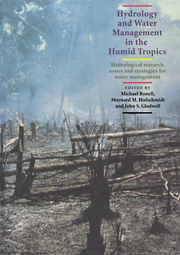 Hydrology and Water Management in the Humid Tropics
Hydrology and Water Management in the Humid Tropics Book contents
- Frontmatter
- Contents
- List of Authors
- Foreword by Federico Mayor, Director-General, UNESCO
- Preface
- Cartographic Credit
- Acknowledgements
- SECTION I INTRODUCTION
- SECTION II HUMID TROPICS SETTING
- SECTION III REGIONAL HYDROLOGY
- SECTION IV PHYSICAL PROCESSES
- 11 Recent Scientific Developments and Research Needs in Hydrological Processes of the Humid Tropics
- 12 Groundwater Systems in the Humid Tropics
- 13 Perspectives on the Hydrology and Water Resource Management of Natural Freshwater Wetlands and Lakes in the Humid Tropics
- 14 Erosion and Sedimentation
- 15 Water Quality Issues in the Humid Tropics
- 16 Ecological Characteristics of Tropical Fresh Waters: An Outline
- SECTION V PHYSICAL PROCESSES – HUMAN USES: THE INTERFACE
- SECTION VI MANAGEMENT ISSUES
- SECTION VII APPENDICES
- Place index
11 - Recent Scientific Developments and Research Needs in Hydrological Processes of the Humid Tropics
Published online by Cambridge University Press: 23 December 2009
- Frontmatter
- Contents
- List of Authors
- Foreword by Federico Mayor, Director-General, UNESCO
- Preface
- Cartographic Credit
- Acknowledgements
- SECTION I INTRODUCTION
- SECTION II HUMID TROPICS SETTING
- SECTION III REGIONAL HYDROLOGY
- SECTION IV PHYSICAL PROCESSES
- 11 Recent Scientific Developments and Research Needs in Hydrological Processes of the Humid Tropics
- 12 Groundwater Systems in the Humid Tropics
- 13 Perspectives on the Hydrology and Water Resource Management of Natural Freshwater Wetlands and Lakes in the Humid Tropics
- 14 Erosion and Sedimentation
- 15 Water Quality Issues in the Humid Tropics
- 16 Ecological Characteristics of Tropical Fresh Waters: An Outline
- SECTION V PHYSICAL PROCESSES – HUMAN USES: THE INTERFACE
- SECTION VI MANAGEMENT ISSUES
- SECTION VII APPENDICES
- Place index
Summary
ABSTRACT
This chapter outlines some of the research developments in process hydrology within the humid tropics. Several gaps in research will be identified. Consequently, a considerable proportion of the chapter will consider technology-transfer of various methodologies and research findings from other climatic regions which may be either appropriate for application or need further testing in various humid tropical environments.
The chapter will systematically review process research connected with the water balance components: rainfall, evaporation, unsaturated zone (soil water), groundwater and runoff generation. Later, the effect of land-use impacts on some of the water balance components will be considered and an evaluation will be made of some “physically-based” modelling techniques which have potential for application in land management issues. Throughout this review, the meteorological and climatological linkages with process hydrology at different scales will be emphasized. Such linkages will particularly emerge during a consideration of recent progress and documentation of future planned “macrohydrology” projects connected with this climatic region.
INTRODUCTION
Since the 1960s, considerable progress has been made in process hydrology research in the temperate latitudes (e.g. Anderson & Burt, 1990; Calder, 1990; Ward & Robinson, 1990). In comparison, the humid tropics has received less attention, mostly for social and economic reasons (Bonell, 1991b, c). The last decade, however, has witnessed an upsurge in world-wide concern over the environmental consequences of converting tropical forests to other land uses. Part of this environmental debate has focused on the hydrological and climatic changes emanating from forest clearance, most notably related to the Amazon Basin because it is one of four major energy (latent heat) sources to the global circulation of the atmosphere (see Molion; Manton & Bonell, this volume).
- Type
- Chapter
- Information
- Hydrology and Water Management in the Humid TropicsHydrological Research Issues and Strategies for Water Management, pp. 167 - 260Publisher: Cambridge University PressPrint publication year: 1993
- 52
- Cited by
